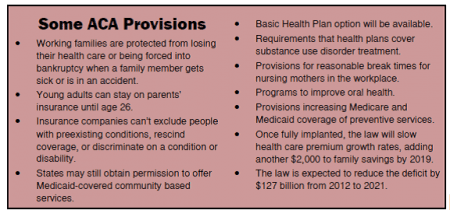On Thursday, June 28, the U.S. Supreme Court upheld the constitutionality of the Affordable Care Act (ACA), a landmark law enacted in 2010 to improve the health of all Americans and control health care costs. The ACA provisions include:
- Minimum essential coverage, requiring individuals to have minimum essential coverage or pay a penalty (a.k.a. individual mandate or individual responsibility).
- Medicaid Expansion (2014), extends coverage to individuals with incomes below 133 percent (plus an additional 5 percent stand-ard disregard) of the federal poverty level.
There were four issues considered by the Court as discussed by the American Public Health Association, Network for Public Health Law, and School of Public Health and Health Services at George Washington University on a July 5, 2012, webinar.
Does the Anti-Injunction Act bar challenge to the minimum coverage provision’s penalty until it goes into effect in January 2014? The shared responsibility payment imposed on those who forgo health insurance is described as a penalty, and Congress deliberately did not use the word “tax”. The purpose of the payment requirement is to give individuals an incentive to have minimum coverage, not to raise revenue. The ACA describes many other exaction’s it creates as taxes. The penalty is not one of them. “In distinguishing penalties from taxes, the Court has explained that if the concept of penalty means anything, it means punishment for an unlawful act or omission. While the individual mandate clearly aims to induce the purchase of health insurance, it need not be read to declare that failing to do so is unlawful. Neither the Act nor any other law attaches negative legal consequences to not buying health insurance, beyond requiring a payment to the IRS.”
Does Congress have the power under the Constitution to enact the minimum essential coverage provision under the Commerce and Necessary and Proper Clauses? Congress does not have the power to regulate inactivity, which is what the failure to purchase insurance is. The Necessary and Proper Clauses only authorizes actions to be taken in furtherance of a constitutional power. The individual mandate does not regulate existing commercial activity. It instead compels individuals to become active in commerce by purchasing a product, on the ground that their failure to do so affects interstate commerce.
Does the mandatory Medicaid expansion impermissibly coerce the States into continuing their participation in the Medicaid program? The Medicaid expansion is part of the larger ACA and is the only way for states to cover low income people. Medicaid has grown to the point where states cannot afford to decline the expansion and lose all federal Medicaid funds. Potential loss of all Medicaid funding is too onerous a condition. The Medicaid expansion “accomplishes a shift in kind, not merely degree. The original program was designed to cover medical services for four particular categories of the needy: the disabled, the blind, the elderly, and needy families with dependent children.”
“Under the Affordable Care Act, Medicaid is transformed into a program to meet the health care needs of the entire nonelderly population with income below 133 percent of the poverty level.”
If unconstitutional, can the minimum coverage requirement be severed from the remainder of the Act? Congress can offer funds under the ACA to expand availability of health care, and require that States accepting such funds comply with the conditions on their use. Congress is not free to penalize States that CHOOSE NOT to participate in that new program by taking away their existing Medicaid funding.
Other challenges that are being discussed and reviewed include: contraception coverage requirement (employers claiming violation of religious freedom), independent payment advisory board (created to monitor Medicare spending), and challenges based on invasion of privacy, interference with medical autonomy, and usurping legislative authority. In the news recently, it was questioned whether ACA is a “job killer” in that it will reduce the amount of labor used in the economy by about 800,000 jobs. Some low-wage jobs might be lost due to workers choosing to retire earlier or work part-time for they will no longer be dependent on employers for their health care safety net. ACA is modeled under the Massachusetts mandated health insurance law, an act providing access to affordable, quality, and accountable health care.
To learn more about Massachusetts law visit: http://www.lawlib.state.ma.us/subject/about/healthinsurance.html.





